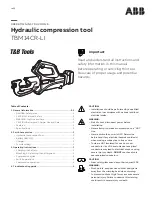
2
AGL_AC_ST_YRH_EN_Rev01
1.2 Safety statements
▪
Refrigerant compressors must be employed only for their intended use. The system has
to be labelled according to the applicable standards and legislation.
▪
Only qualified and authorized RACHP (refrigeration, air conditioning and heat pump
personnel) are permitted to install, commission and maintain this equipment. Only
competent personnel (as specified in EN 13313) qualified for flammable refrigerant
handling are permitted to commission, initiate and maintain the compressor/refrigeration
systems; non-trained personnel, including the user, are not allowed to do so and must call
on an expert.
▪
The maximum refrigerant charge is specified in standards such as, but not limited to
EN 378. The system designer shall implement all safety measures defined by the
applicable standards and the maximum refrigerant charge shall not be exceeded.
▪
If a flammable atmosphere is detected, immediately take all necessary precautions to
mitigate the risk as determined in the risk assessment.
▪
Electrical connections must be made by qualified electrical personnel.
▪
All valid standards for connecting electrical and refrigeration equipment must be
observed.
▪
The national legislation and regulations regarding personnel protection must be observed.
Use personal safety equipment.
Safety goggles, gloves, protective
clothing, safety boots and hard hats should be worn where
necessary.
1.3 General instructions
WARNING
Pressurized system! Serious personal injuries and/or system
breakdown!
Accidental system start before complete set-up must be avoided.
Never leave the system unattended without locking it out electrically when it is
on vacuum and has no refrigerant charge, when it has a holding charge of
nitrogen, or when the compressor service valves are closed.
WARNING
System breakdown! Personal injuries!
Only approved refrigerants and
refrigeration oils must be used.
WARNING
High shell temperature! Burning!
Do not touch the compressor until it has
cooled down. Ensure that other materials in the area of the compressor do not
come into contact with it. Lock and mark accessible sections.
CAUTION
Overheating! Bearing damage!
Do not operate compressor without
refrigerant charge or without it being connected to the system.
CAUTION
Contact with refrigerant oil! Material damage!
Polyolester (POE) and poly-
alkylene glycol (PAG) lubricants must be handled carefully and the proper
protective equipment (gloves, eye protection, etc.) must be used at all times.
Refrigerant oil must not come into contact with any surface or material that it
might damage, including but without limitation, certain polymers, eg,
PVC/CPVC and polycarbonate.
IMPORTANT
Transport damage! Compressor malfunction!
Use original packaging.
Avoid collisions and tilting.






































